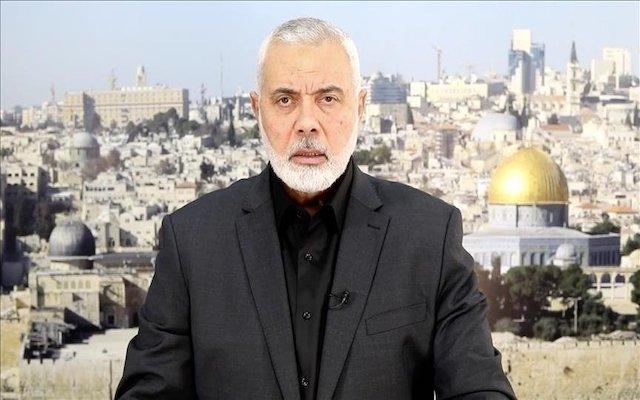Hamas leader Ismail Haniyeh discussed the failure of truce negotiations just before Ramadan, attributing the breakdown to Israel's reluctance to commit to a permanent ceasefire. This assertion comes amidst discussions by Israel’s war cabinet, led by Prime Minister Benjamin Netanyahu, Defense Minister Yoav Gallant, and Minister Benny Gantz, on the faltering efforts to secure a war pause and ensure the release of hostages.
Haniyeh, in a statement from Qatar, criticized Israel for not providing concrete assurances on the ceasefire, troop withdrawal, or arrangements for displaced Gazans. This follows a rare accusation from Israel’s Mossad, which criticized Hamas for escalating demands and showing a preference for conflict during the sacred month.
Hamas leader Ismail Haniyeh released a video in which he threatened that Israel won’t recover any of the 134 hostages unless the IDF leaves Gaza.
— Aviva Klompas (@AvivaKlompas) March 10, 2024
Speaking of leaving Gaza, Haniyeh left Gaza for a life of luxury and comfort in Qatar in 2017.
Despite the accusations of intransigence, Haniyeh maintains that Hamas approached the talks with a constructive and responsible attitude, emphasizing the group's refusal to settle for an agreement that neither ends the conflict nor secures the withdrawal of Israeli forces from Gaza. Israel, on the other hand, has dismissed Hamas's demands, particularly the precondition of ending the war for further hostage releases, as unrealistic.
The discussions also touched upon logistical preparations for Ramadan and the provision of humanitarian aid to Gaza. Amidst these contentious exchanges, Haniyeh expressed a willingness to continue negotiations, holding Israel accountable for the impasse yet reiterating openness to dialogue.
Ismail Haniyeh: "The battle [massacre and mass rape] on October 7 brought about a deep and important change at the international level for the Palestinians"
— Marc Zell (@GOPIsrael) March 11, 2024
TRUE: it exposed the true face of Palestinian nationalism ==> its only purpose is the destruction of Israel and its…
Significantly, Haniyeh acknowledged the support of Hezbollah, the Houthis, and other Iran-backed forces, reinforcing Hamas's commitment to Israel's destruction. Efforts to rejuvenate truce talks have seen involvement from Egypt, the United States, and Qatar, aiming to mediate a six-week ceasefire based on a framework proposed in Paris. This plan involves a phased hostage release in exchange for Palestinian prisoners, a proposal so far rejected by Hamas.
Israel's abstention from the latest Cairo talks, prompted by Hamas's refusal to list living hostages, and a subsequent departure of a Hamas delegation to Qatar, highlights the deepening rift. Israeli officials attribute this stalemate to a strategy by Hamas's Gaza leader, Yahya Sinwar, leveraging civilian suffering for negotiating advantages.
The last time the president of the Red Cross visited Qatar and met with Ismail Haniyeh, was in 25.11.23, before the first hostages deal. Today they met again.
— Voice from the East (@easternvoices) March 11, 2024
In parallel, today Israel released 56 prisoners back to Gaza through
Kerem-Shalom passage.
Is there a connection here? pic.twitter.com/pt4tRoWhNy
The internal dynamics within Hamas reveal a conflict of strategy between Sinwar and external leadership, including Haniyeh, over the acceptance of temporary truces versus holding out for more significant Israeli concessions. The discussions have reportedly backtracked from the Paris agreement, with Hamas now demanding a full troop withdrawal, the return of displaced Gazans, and comprehensive provisions for the enclave's rebuilding, all before it will even discuss hostages. In fact, Haniyeh threatened that if Israel does not leave the enclave altogether, it will nver see any of the hostages again.
Qatar's reported ultimatum to Hamas leadership regarding the expulsion over failure to secure a deal underscores the escalating pressure for resolution. With the potential for increased violence during Ramadan, the situation remains tense and fraught with complexity. Both Hamas and Israel continue to bear the scars of a conflict marked by significant civilian and militant casualties, underscoring the urgent need for a diplomatic breakthrough.


